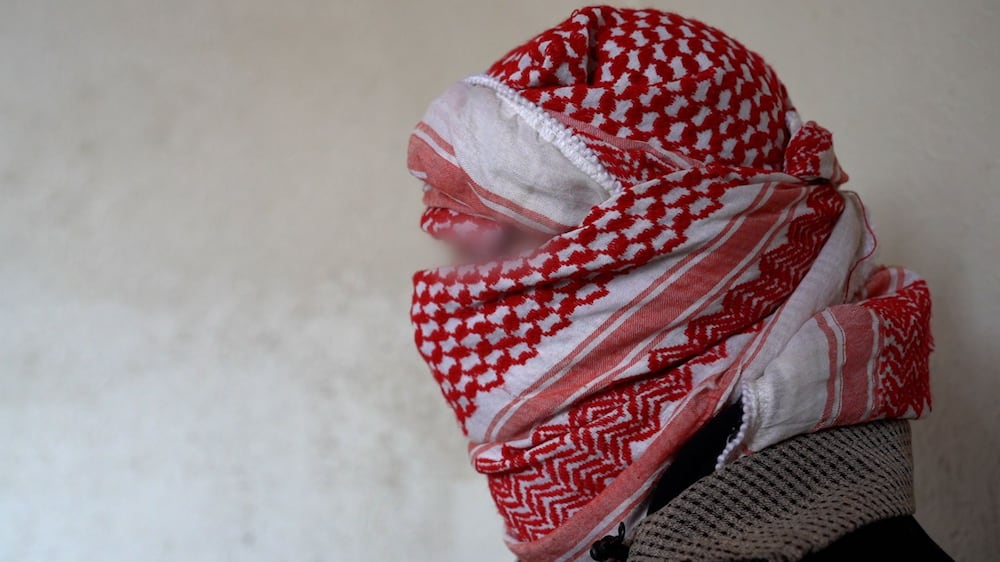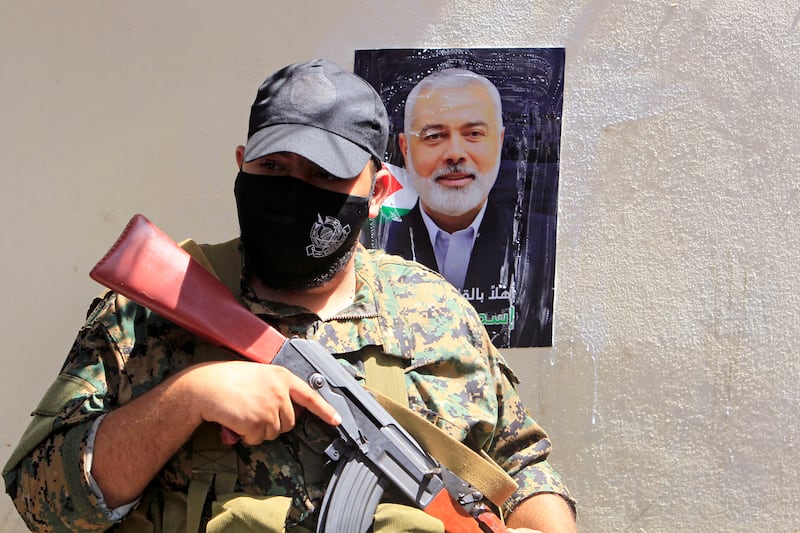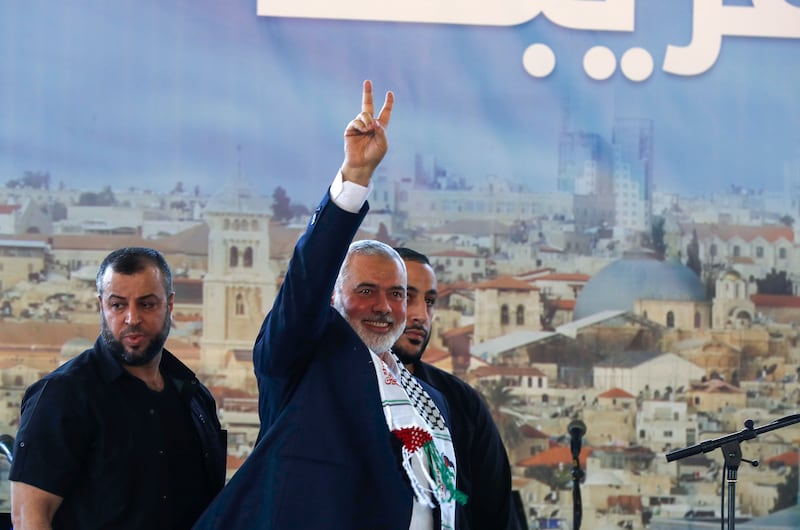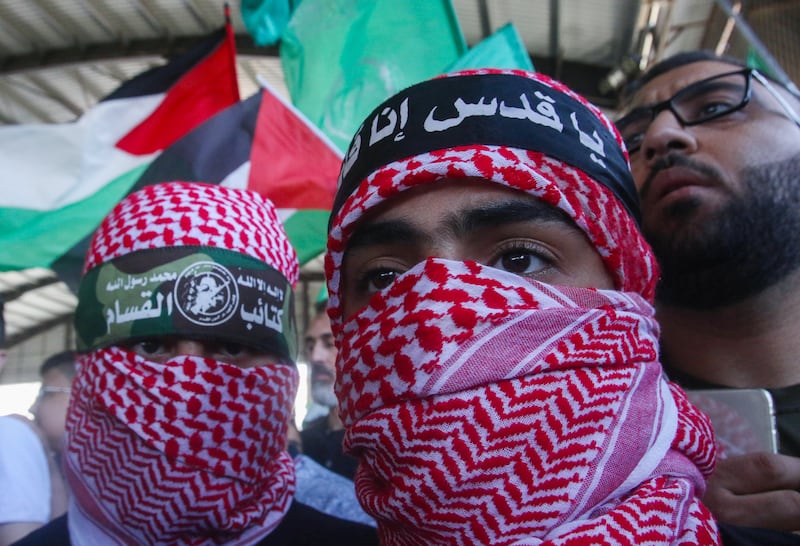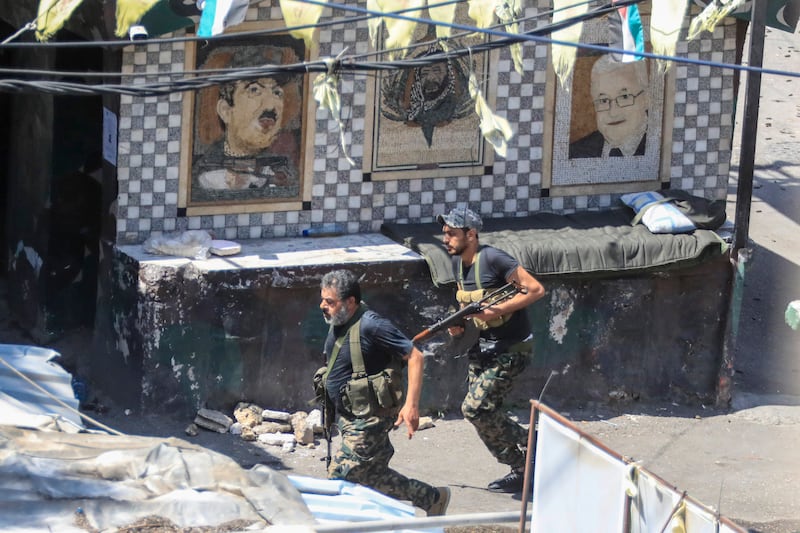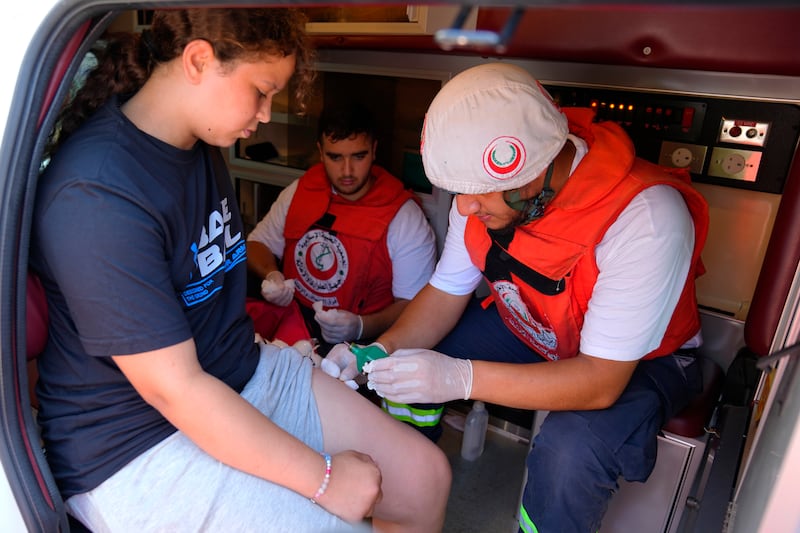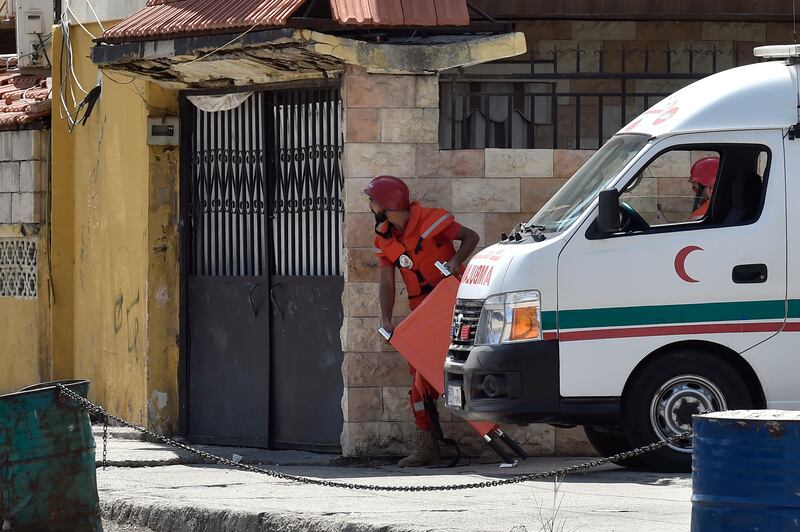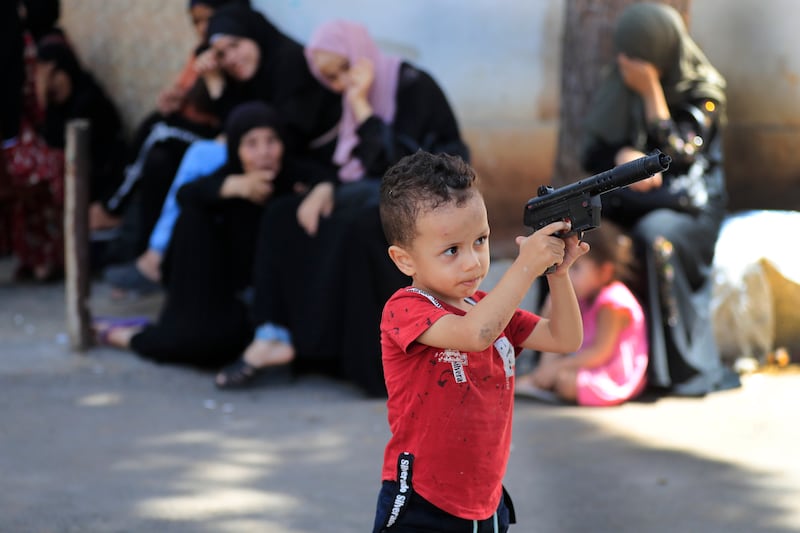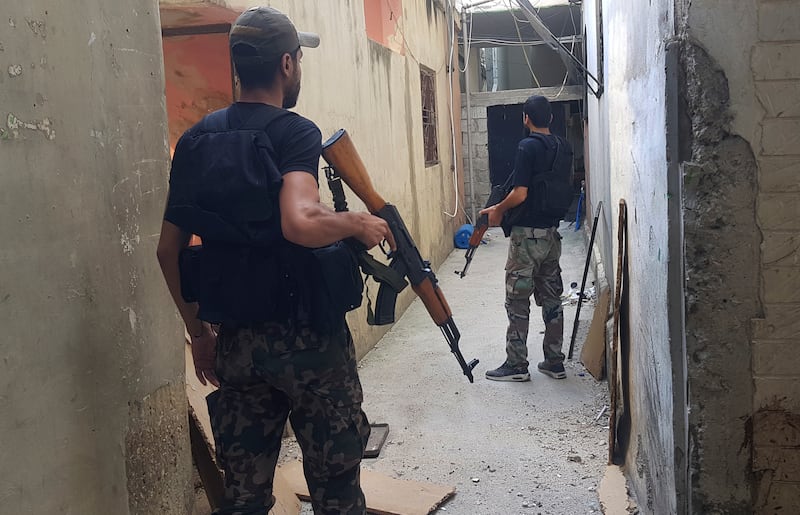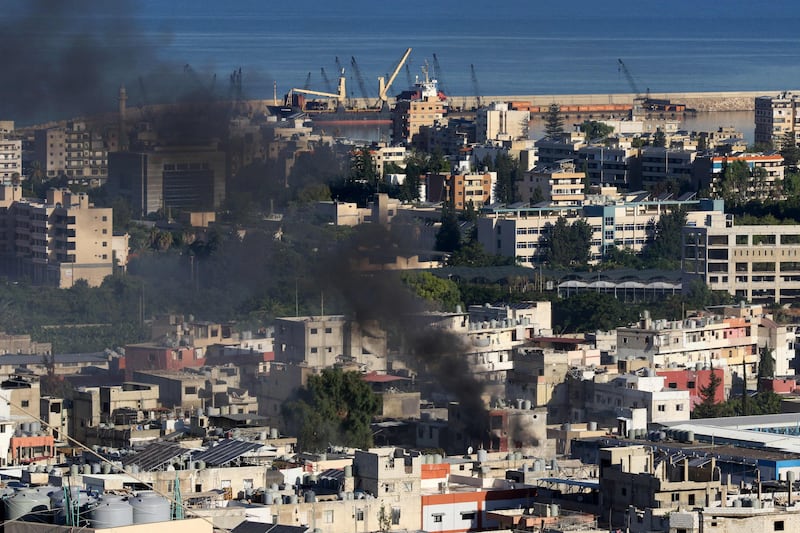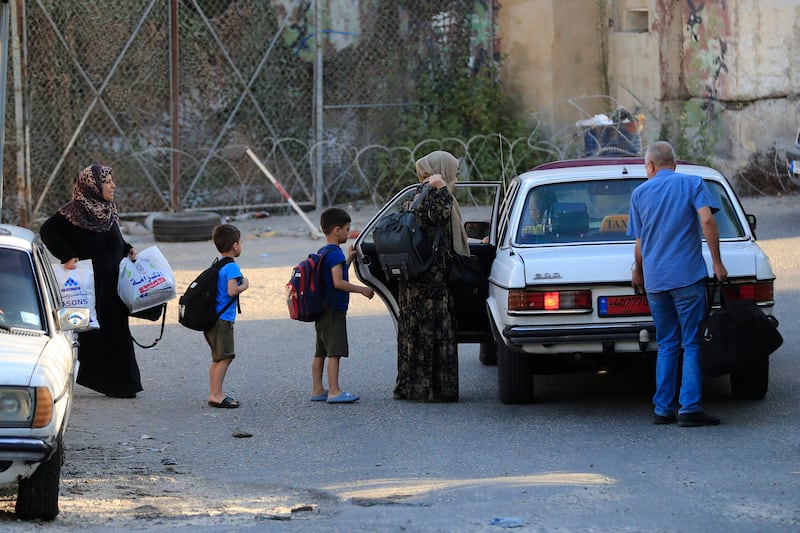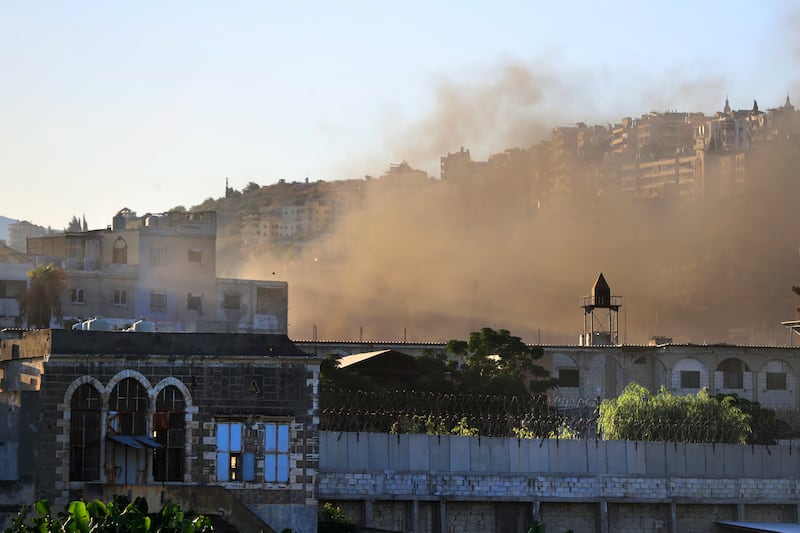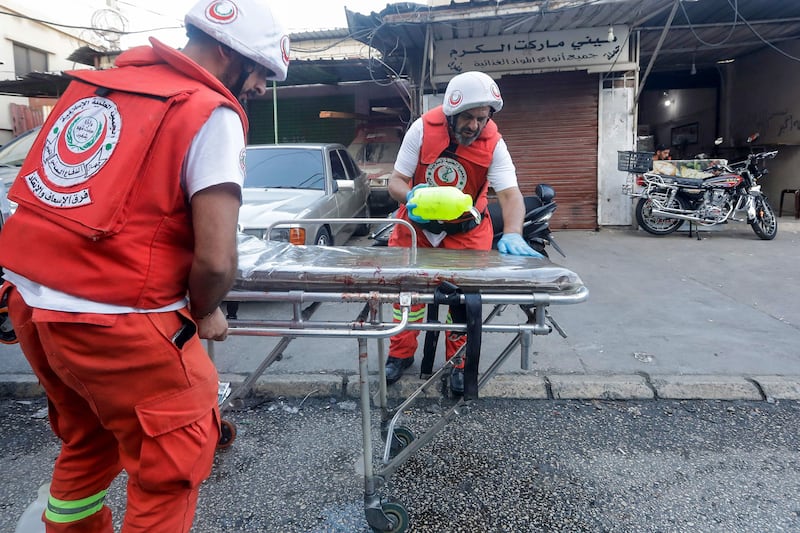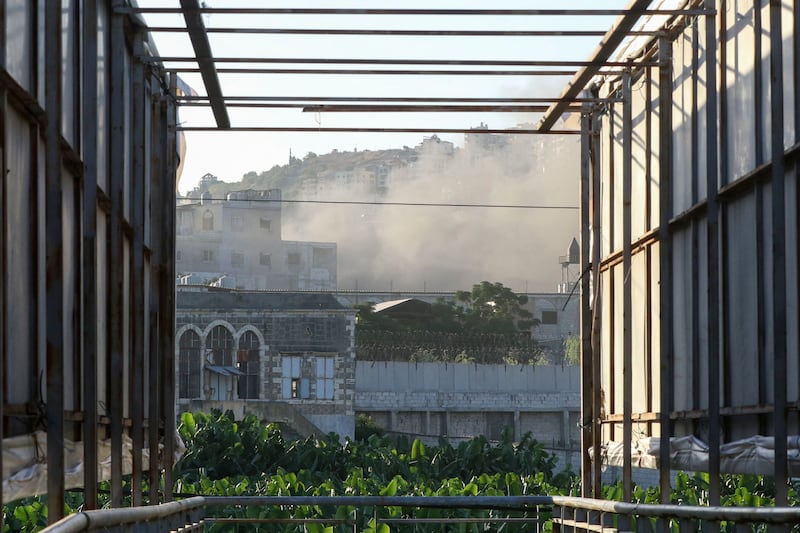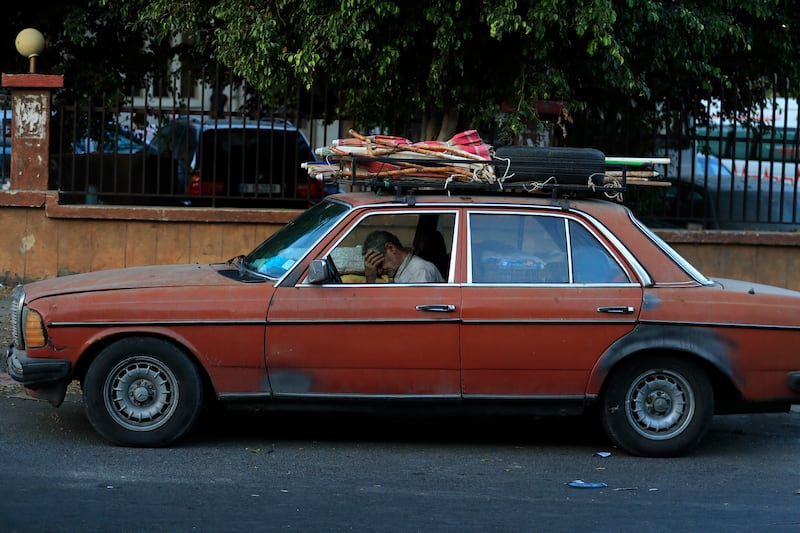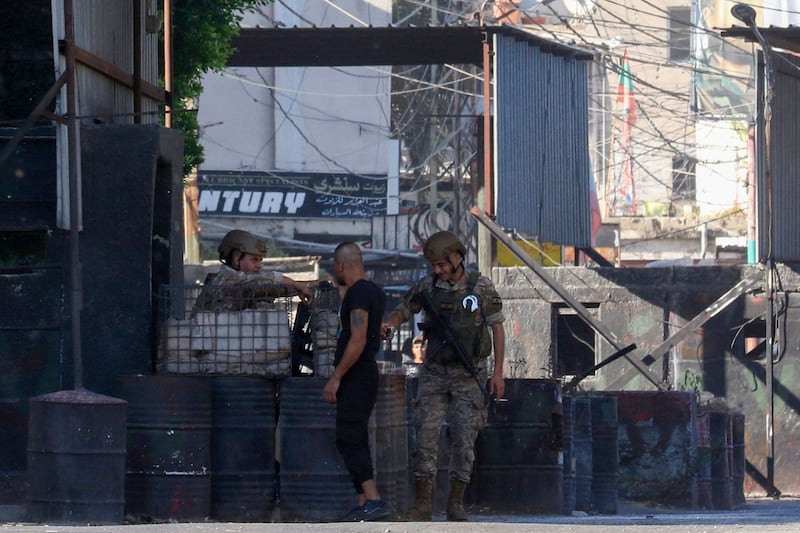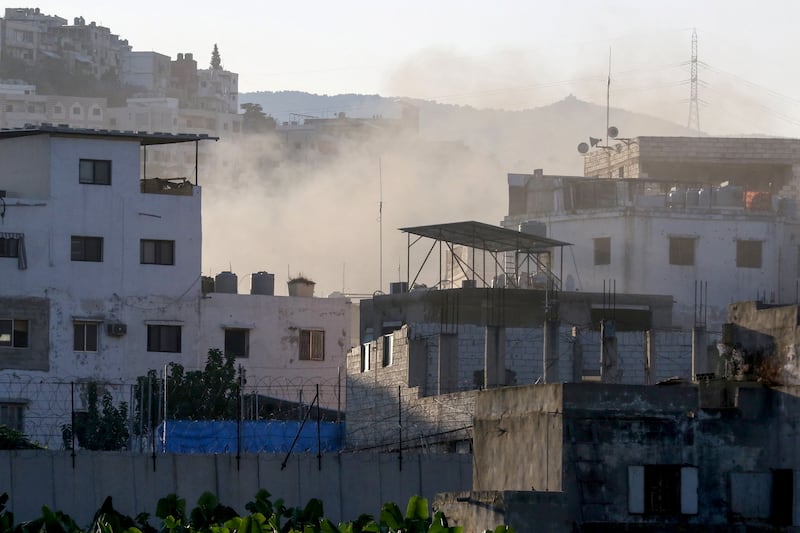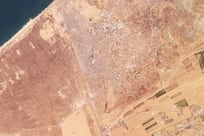Live updates: Follow the latest news on Israel-Gaza
Abbas didn’t finish high school. He didn’t see much point.
He grew up in Ain Al Hilweh, the largest refugee camp for Palestinians in Lebanon. There, he said, most Palestinians with university degrees wind up working blue-collar jobs, if they’re lucky enough to find employment at all.
Instead, Abbas joined the armed wing of the Hamas movement, the Ezzedine Al Qassam Brigades. It was a decision he said was born out of a deep desire to feel at home.
There are few opportunities available to Palestinians in Lebanon, and life on the fringes of society has always made him “feel like a guest”.
“We don't live on our own land,” he told The National. “In Palestine – if Palestine was free – I would have my rights as a human being. I would be in my own land.”
From the outside, Abbas looks like any other young man. His casual attire and tranquil demeanour do not suggest the 32-year-old is a fighter in Hamas’s armed wing. Like many Palestinians, his light-hearted disposition hides the ache of living in multi-generational purgatory.
“I didn’t want to sit around waiting,” he said of his decision to become a militant. “I wanted to feel like I’m helping my homeland.”
Seventeen years have passed since Abbas joined Hamas. Since then, the group has grown more powerful – in the occupied Palestinian territories and in host countries where significant Palestinian refugee populations reside, including Lebanon.
The assault on southern Israel on October 7, in which about 1,200 Israelis were killed, has been a turning point for the group’s popularity among Palestinian refugees in Lebanon.
Although heavily criticised by the international community, for Palestinians, the attack shattered the illusion of Israel’s invincibility and returned the issue of Palestinian statehood to the spotlight.
Hamas was quick to capitalise on its growing popularity, announcing the creation of a new youth mobilisation unit in December: The Vanguards of Al Aqsa Flood.
In a press release at the time, the group called on “the youth and men of our people to join the vanguard resistance fighters and take part in shaping the future, and in liberating Jerusalem and Al Aqsa Mosque”.
Abu Nouh, a recruiter for the Vanguards, told The National that more than 1,000 people have joined in southern Lebanese city of Saida alone. He declined to say how many are estimated to have joined throughout the country, but said the goal was to enroll 10,000 nationwide.
“After October 7 many youths came to us – they wanted to learn more, and some were asking to join the resistance,” Abu Nouh told The National. “It’s why we created the Vanguards."
The National sat down with Abbas, youth recruiters and political officials to understand what has motivated young people in Lebanon to join Hamas since October 7.
Youth recruitment
By 15, before he dropped out of school, Abbas and a group of his friends had already enrolled in Hamas’s youth movement, the Scouts of the Night Journey – a programme that provided educational and religious classes, in addition to physical and outdoor activities. After a few years, the scouts graduated to basic military training. By 17, Abbas was a formal member of Al Qassam Brigades.
All Palestinian factions offer youth programmes in the refugee camps, including Hamas’s main rival, Fatah.
In a way, it is a form of recruitment. But it has also been described as a way to mitigate the aimlessness of youth in the cramped camps, where more vulnerable teenagers can be swept into drugs, violence, or religious extremism.
According to Hamas official Abu Abed Shanaa, a community leader in Saida, the group holds youth scouting programmes “to avoid kids going down the wrong path”.
Scouting programmes take place inside the refugee camps and attract members who are already inclined towards their respective political affiliations. The Vanguards are a similar concept.
The main difference is that the Vanguards “have a broader reach”, Abu Nouh said, as it recruits youth from inside and outside the refugee camps and from various political backgrounds between the ages of 17 and 24.
Mr Shanaa said that since October 7, Hamas had received many requests from young people in Lebanon who were hoping to join immediately.
Young Palestinians sought to join in the fight on the southern Lebanese border, where Iran-backed Hezbollah has engaged in an intense cross-border conflict against Israel in co-ordination with Hamas and other militant groups.
This is due in part to the perception among many Palestinians that diplomacy has failed to create a viable Palestinian state, and that Hamas is the only organisation powerful enough to confront Israel.
“In the absence of any alternatives at this point, younger generations – especially over the last few years – have been swayed towards armed resistance because they feel like conciliatory politics or diplomacy doesn't work with Israel,” Tahani Mustafa, a senior Palestine analyst at the Crisis Group, told The National.
Boy Scouts or Hamasland?
The creation of the Vanguards in December was followed by an outcry from the Lebanese political scene. In Lebanon, Palestinian militancy has been a touchy subject since the country’s 1975-1990 civil war, which some say was exacerbated by the Palestinian presence.
“The Vanguards of Al Aqsa Flood should be established in Palestine, not in Lebanon and not from Lebanon,” Kataeb leader Sami Gemayel wrote on social media. “We will not return to a bygone era.”
Several other Lebanese politicians evoked the term “Hamasland” – a reference to Fatahland, the term used when the Palestine Liberation Organisation led by Yasser Arafat operated freely in southern Lebanon and used it as a base to attack Israel. Fatahland was effectively a state within a state from the late 1960s until the PLO leadership’s expulsion from Lebanon in 1982.
“It’s a legitimate concern that is emanating from the experience of the Lebanese civil war,” said Mohanad Hage Ali, a senior fellow at the Carnegie Middle East Centre. “At the end of the day, for many in Lebanon, using the country as a launching pad for attacks against Israel is controversial given the history of the civil war and the activism of Palestinian militants.
“Hamas has definitely expanded in a way that no other Palestinian faction has done in Lebanon since the end of the Lebanese civil war.”
Hamas leaders dismissed the comparisons to Fatahland, leaning heavily into the idea that the creation of the Vanguards was an attempt to curb chaotic attempts by young Palestinians to gather at the border.
They framed the Vanguards as a form of youth outreach and empowerment, despite wide speculation that the group was attempting to consolidate its armed presence in Lebanon, where Fatah remains the dominant party inside the camps.
“It’s just an extension of our summer camp programs,” Mr Shanaa told The National.
Abou Nouh called the Lebanese outcry “a misunderstanding. It was falsely interpreted by some Lebanese politicians that we wanted to create an army of young soldiers."
He explained that the Vanguard is similar to the scouts, with classes and weekend outings in the summer.
“Its objective is to keep the idea of the liberation of Palestine alive in our youth,” he said.
The goal, he added, was not necessarily to ensure youth joined Hamas as a political or militant movement, but to ensure they remained committed to national liberation – whether they decide to join Hamas in the end or not.
But, Mr Hage Ali said, “everything starts with scouting”. Inevitably, some scouts will join Al Qassam Brigades, just as Abbas did years ago.
Still, Abou Nouh was adamant that forming an army was not the ultimate goal.
“We don’t care if they join Hamas or not, we care that they stay committed to the Palestinian cause,” he said. "We want to build a nation with individuals competent in various fields: doctors, engineers … normal people. We’re raising a generation.”
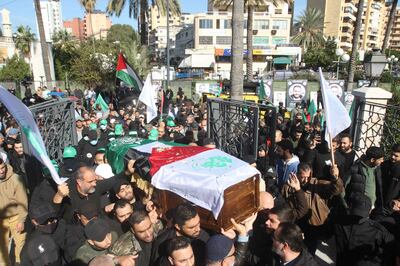
Fighting in southern Lebanon
After years of scouting, Abbas decided to enroll in the military wing of Hamas. Basic training took place in Hezbollah's military bases.
But the extent of their training in Lebanon was limited. The rest of the training takes place outside Lebanon, such as in Iran, where Abbas has been twice – including once last year.
His last training – just before October 7 – was so intense it was almost unbearable, he told The National.
It took place in one of Iran’s large military bases, where Al Qassam Brigades fighters engaged in a live war simulation with other armed groups.
“We were with Hezbollah, Iranians, Yemenis, Iraqis. It was the whole resistance axis,” Abbas said. “We really felt like we were in a war.”
The simulation lasted for days, affording them little sleep, and what they got was interrupted by simulated bombardment. “At that time, I didn't know they were preparing an attack from Gaza. In hindsight it makes sense. We trained for it.”
Since the Israel-Gaza war started, Abbas has spent time fighting in southern Lebanon, taking part in the cross-border attacks against Israel.
Almost four months into the conflict, the Lebanon-Israel border has effectively turned into a militarised zone. Tens of thousands of residents on both sides of the frontier have fled from the violence.
More than 200 people have been killed in Lebanon, according to an AFP tally. The vast majority are Hezbollah fighters. Ten Hamas members have also been killed, along with 26 civilians. On the Israeli side, nine soldiers and six civilians have lost their lives in the conflict, according to the Israeli army.
Still, the dangerous raids are the closest Abbas has ever gotten to setting foot in his homeland.
Abbas didn’t finish high school. Even back then, the now 32-year-old knew his purpose.
“I know the end of this road,” he said, resolutely. “It’s either victory, or it’s martyrdom.”
